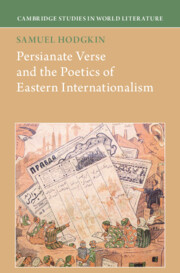Book contents
- Persianate Verse and the Poetics of Eastern Internationalism
- Cambridge Studies in World Literature
- Persianate Verse and the Poetics of Eastern Internationalism
- Copyright page
- Contents
- Figures
- Acknowledgments
- Technical Note: Translation, Transliteration, and Dates
- Introduction
- Chapter 1 Tribunes
- Chapter 2 Canons
- Chapter 3 Occasions
- Chapter 4 Translations
- Chapter 5 Recognitions
- Conclusion
- Appendix: A Commemorative Compendium (Tazkira) of Writers, Scholars, Bureaucrats, and Saints
- Notes
- Bibliography
- Index
Conclusion
Old Verses for a Persianate Internationalist Future
Published online by Cambridge University Press: 14 December 2023
- Persianate Verse and the Poetics of Eastern Internationalism
- Cambridge Studies in World Literature
- Persianate Verse and the Poetics of Eastern Internationalism
- Copyright page
- Contents
- Figures
- Acknowledgments
- Technical Note: Translation, Transliteration, and Dates
- Introduction
- Chapter 1 Tribunes
- Chapter 2 Canons
- Chapter 3 Occasions
- Chapter 4 Translations
- Chapter 5 Recognitions
- Conclusion
- Appendix: A Commemorative Compendium (Tazkira) of Writers, Scholars, Bureaucrats, and Saints
- Notes
- Bibliography
- Index
Summary
This chapter documents the constellation of films and literary works extending outward from the Eastern international in the late- and post-Soviet years when socialist internationalism pivoted from an east–west to a north–south axis and then dissipated (1960s–1990s). It affirms the enduring coherence of the Persianate literary space, now bound together by Soviet models of literary representation. The chapter samples the occasional poetry produced by Eastern literary representatives involved in Soviet–Third-World cultural diplomacy at Cold War literary congresses, especially through the Afro-Asian Writers’ Association. However, it also shows how artists gripped by classical Persianate forms continued to find and respond to each other after Soviet-backed literary institutions lost international legitimacy. The chapter discusses several Persian and Uzbek texts from the Soviet–Afghan War, including a leading Afghan communist literary bureaucrat’s mystical love poem to an Islamist insurgent, written continuously from 1980–2020. Its other central case study is the impact of the Soviet Armenian filmmaker Sergei Parajanov’s film The Color of Pomegranates as a model for Persianate poetics on film, including in the Islamic Republic of Iran, including in the art films of Muhsin Makhmalbaf. The chapter tempers the elegiac impulse of the post-Persianate left with an affirmation of the tradition’s continued vitality.
The conclusion reviews the arguments developed throughout the book. This summary is framed by a consideration of the changing meanings of the poetic figures of the rose and nightingale in the Persianate twentieth century. Accordingly, each chapter is elucidated through a reading of that chapter’s classical Persian or Turkic epigraph.
Keywords
- Type
- Chapter
- Information
- Persianate Verse and the Poetics of Eastern Internationalism , pp. 197 - 202Publisher: Cambridge University PressPrint publication year: 2023

